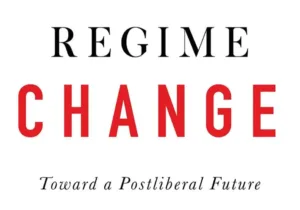There is a growing tendency among some on the post-liberal Christian Right to offer at least soft sympathy to dictatorships deemed socially conservative, in contrast to Western wokery.
Recently Matt Schmitz his new publication The Compact noted:
Socially conservative beliefs are increasingly associated with America’s rivals. In September, China’s National Radio and Television administration instructed broadcasters not to depict niangpao, a term that roughly translates to “sissy men.” This followed an August announcement that children under 18 would no longer be able to play online games on weekdays and would be permitted only three hours of play every weekend. The Communist Party has reversed its infamous one-child policy and declared its intention to reduce “medically unnecessary” abortions.
And:
Now that America’s foreign-policy establishment has turned on social conservatives, social conservatives are well-positioned to become less ideological and more realistic about foreign policy. They can see the danger in calls to spread a dubious idea of liberty. They can understand why other countries reject the American ruling class’s orthodoxies. They can hope that their nation, no less than Russia, will one day cast off the ideology to which it has become captive.
Before Putin started invading countries, some Christians, like Franklin Graham, openly admired his regime’s purported social conservatism and alignment with Russian Orthodoxy, although neither boded well for the religious freedom of Catholics or Evangelicals in Russia, much less wider human rights concerns. At least it can be said Russia is, at least historically, Christian, with a government that subsidizes (and exploits) the church. Sohrab Ahmari, a Compact co-founder and friend to Catholic integralism, infamously tweeted last year that he was “at peace with a Chinese-led 21st century,” because “[l]ate-liberal America is too dumb and decadent to last as a superpower.” He noted: “Chinese civilization especially if it recovers more of its Confucian roots, will possess a great deal of natural virtue.”
These perspectives somewhat echo the Russian Orthodox Patriarch’s justification for Russia’s attack on Ukraine, in which he complained that Western democracies hosted gay pride parades, which Russia refuses to do: “Pride parades are designed to demonstrate that sin is one variation of human behavior. That’s why in order to join the club of those countries, you have to have a gay pride parade.”
It should be acknowledged that there’s truth in the critique that democracies are, in some sense, more unruly and decadent than dictatorships. Democracies allow free speech, free expression and largely allow their people to live as they please. There are gay pride parades and other forms of open sexual libertinism. Dictatorships, ever fearful of dissent and disorder, more typically suppress bohemian and libertine behavior. Repressive regimes seek hierarchy and conformity. They typically profess to be pro-family.
But do these purportedly pro-family dictatorships merit sympathy from Western social traditionalists? The question has geopolitical implications.
If Ukraine tolerates LGBTQ advocacy while Russia does not, should Western social conservatives therefore accept Patriarch Kirill’s argument and align with Russia? Since Taiwan has same sex marriage and China does not, should Western social conservatives align with dictatorial China against democratic Taiwan, even if China invades Taiwan? Tel Aviv hosts large gay pride parades, while Israel’s enemy Iran sometimes executes homosexuals. Iran under its Islamist theocracy is certainly socially conservative. Should Western social conservatives therefore sympathize with Iran over democratic Israel?
Very few American social conservatives, most of whom are Christian, would ever want to live in Iran, China or Russia, where their liberties, including religious freedom, compared to America, would be severely curtailed. A world in which Russia can crush Ukraine, or China can crush Taiwan, or Iran crush Israel, is not a world that would be friendly to American Christian social conservatives. These regimes and their ideologies, despite their professed cultural traditionalism, are fundamentally tyrannical, kleptocratic, corrupt and murderous. They are anti-Gospel.
Some Christian social conservatives need a wider definition of cultural immorality, which includes but is not confined to sexual permissiveness. Regimes that jail, torture and murder their enemies are immoral. Regimes that are lawless are immoral. Regimes that criminalize opposition and free speech are immoral. Regimes that openly plunder their nation are immoral. Regimes that persecute ethnic and religious minorities are immoral. Regimes that launch wars of aggression or threaten to do so are immoral.
It should also be noted that fallen human nature is universal, and nations that purportedly oppose and suppress sexual immorality no doubt still have plenty of it, even if hypocritically unacknowledged.
All nations are sinful. Western democracies now have large ideological movements touting nontraditional sexualities. Christians and social conservatives should challenge this advocacy with their own counter narrative about more abundant life. But America and the West did not become corrupt just in recent years. We have always had our immoralities, hypocrisies and injustices.
Probably most of the American soldiers who stormed Normandy were racists by contemporary standards. The U.S. Army was segregated and black soldiers were consigned to subordinate positions. Many black soldiers in WWII, even as they fought for democracy, could not vote in their home states. Some southern congressmen resisted absentee voting by USA military personnel for fear that black soldiers could then vote. Absurd, horrible and hypocritical. And yet, America and its armed forces were the world’s greatest force for justice and liberty in the world, relative to all the alternatives. True then, and still true today.
Some post-liberal Christians of the right now echo the old Religious Left in their ambivalence about if not hostility to America. Like the old Religious Left in the Cold War, they are sometimes reluctant to critique “America’s rivals” because they’re uncertain about who’s really worse.
Christian Realism is not so ambivalent. Reinhold Niebuhr forthrightly admitted America’s grievous sins and failures, warning against hubris and self-righteousness, while insisting repentance and national humility were not at odds with defeating the Axis in WWII or countering the Soviet Bloc in the Cold War. Duty and justice required these sacrificial struggles against totalitarian aggressors. Duty and justice also required national self-reflection and self-improvement. Christians, as in their individual lives, so too in their political outlook, must navigate discerningly on multiple fronts. We are sinners, living in sinful nations, but called to do good where we can.
No Christian of discernment should today be ambiguous about the regimes in Moscow, Beijing or Teheran. We should support America’s responsibility to counter their malevolent influence when possible and to showcase the best principles of our democracy, pointing to life and liberty for all people. At the same time, we must ask God’s mercy for America’s sins, and pray He leads us forward to better days, that we might better exemplify our own professed principles.





